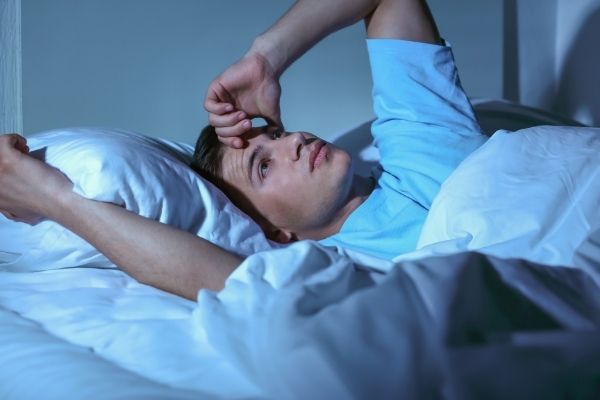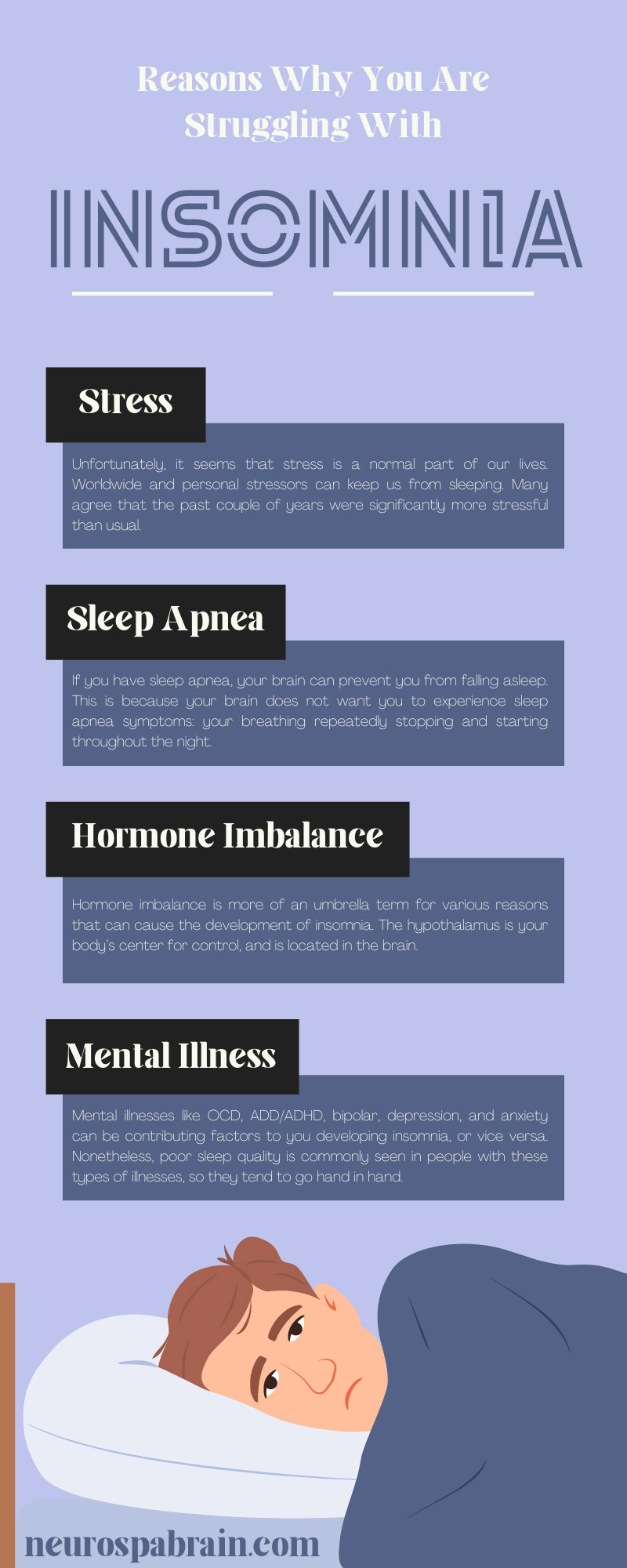
When you think of long nights filled with no sleep, you will feel one of two emotions: excitement or dread. If you have clicked on this article, you likely feel the latter. Perhaps you have been able to keep up with your lack of sleep by supplementing it with caffeine. Is that morning cup of joe no longer working as well as it used to? You’ve likely racked up a sleep debt to the point that even caffeine can’t get you functioning; here are some reasons why you are struggling with insomnia.
What Is Insomnia?
A healthy adult usually falls asleep after 15-30 minutes of rest. Moreover, they will experience little to no prolonged disturbances in their sleep that cause them to be in a state of wakefulness throughout the night. The CDC recommends that adults sleep a minimum of seven hours a night. People with insomnia struggle to fall asleep and stay asleep, and lack the ability to consistently sleep for at least seven hours.
Nothing compares to what healthy and consistent sleep does for our minds and bodies. Sleep gives time for our brains to restructure and organize, which helps strengthen and create neural pathways. Moreover, sleep gives your body time to release hormones and proteins that help repair and restore itself. We all know what it’s like to start our day after a night of tossing and turning—your body aches, you’re irritable, and you feel off.
Stress
Unfortunately, it seems that stress is a normal part of our lives. Worldwide and personal stressors can keep us from sleeping. Many agree that the past couple of years were significantly more stressful than usual.
Moreover, if you run into challenges at work, school, or in relationships, you might find yourself overthinking these topics when you are in bed. All these stressors can culminate and keep your mind awake when it should be relaxing and focusing on sleep.
Sleep Hygiene
Sleep hygiene means having good sleeping habits! You must set yourself up well to get those seven hours your body needs. If you picked up some not-so-helpful habits over the years, you will definitely struggle with sleep. However, you might be able to amend your insomnia if you incorporate some good sleeping habits.
Cut Caffeine
There’s nothing better than the sound of grinding coffee beans and the smell of freshly brewed coffee. If you have a serious coffee obsession, this might be the reason why you struggle with insomnia. Don’t fret! You won’t have to cut coffee from your day completely. Make an effort to finish your last cup before three o’clock in the afternoon; this will allow your body to rid itself of any caffeine that might be keeping you awake.
Remove Distractions
Phones, tablets, flatscreens—oh my! Digital 2 AU screens emanate “blue light,” and you’ve likely heard of it. Blue light is not inherently bad; even the sun emits about one-third of this type of light. Blue light keeps us awake, alert, and ready to start our days. This is useful if you are trying to wake up, but is counterproductive if you are lying in bed ready to catch some shut eye. We can’t deny the fact that technology entrenches our lives, and there’s no way we can do without it. However, we can keep it out of our bedrooms to improve sleep quality.
Sleep Apnea
Did you know that sleep apnea and insomnia can be co-occurrent conditions? If you have sleep apnea, your brain can prevent you from falling asleep. This is because your brain does not want you to experience sleep apnea symptoms: your breathing repeatedly stopping and starting throughout the night. Sleep apnea is extremely hard on your body, and your brain interprets these symptoms as a threat to your survival. When your brain views sleep as the enemy, you can rest assured you won’t be getting any.
Degenerative Conditions
Degenerative diseases like Parkinson’s and Alzheimer’s are commonly associated with insomnia and can lead to it as well. Parkinson’s, much like Alzheimer’s, alters the chemical structure of your brain and affects your sleep behavior, causing sleep disorders. Moreover, individuals with Parkinson’s might be repeatedly forced awake because of symptoms like pain and excessive urination. Due to the progressive nature of these diseases, insomnia can also worsen over time.
Hormone Imbalance
Hormone imbalance is more of an umbrella term for various reasons that can cause the development of insomnia. The hypothalamus is your body’s center for control, and is located in the brain. It maintains homeostasis, and is responsible for sleep regulation and communication between your brain and body that it’s time to rest.
If you deal with chronic stress, your hypothalamic-pituitary-adrenal axis could be chronically activated. The HPA axis controls the communication we just mentioned. If it persists in stimulation, it will constantly release cortisol, keeping you alert and awake. Once stimulated, the HPA axis continues like an echo throughout your body, snowballing into insomnia.
Mental Illness
Mental illnesses like OCD, ADD/ADHD, bipolar, depression, and anxiety can be contributing factors to you developing insomnia, or vice versa. Nonetheless, poor sleep quality is commonly seen in people with these types of illnesses, so they tend to go hand in hand.
For example, anxiety and OCD can cause racing thoughts of worry that are difficult to control, and this can cause your body to produce cortisol as a response. Without the distractions of waking life, these thoughts can easily creep in to keep you up during the night and steal your rest away. Moreover, consistent lack of sleep can exacerbate symptoms of these mental illnesses, making them more difficult to manage.
Neurological
Sleep plays a critical role in our physical, mental, and emotional health, and to our overall well-being. As such, we cannot downplay, negate, or supplement it. If you struggle with insomnia and can’t find solace, NeuroSpa is here to help. We offer an FDA-approved non-invasive treatment for insomnia.
Treatment
To remedy your insomnia, we provide transcranial magnetic stimulation treatment in Orange County, California. First, we will map your brain for any regions that are afflicting your insomnia. Second, our team will instate a treatment plan for you, where we target those afflicted areas with stimulation. This will hit the refresh button on your brain and rewire it for optimal and healthy sleep. After this treatment, you can say goodbye to sleepless nights!


